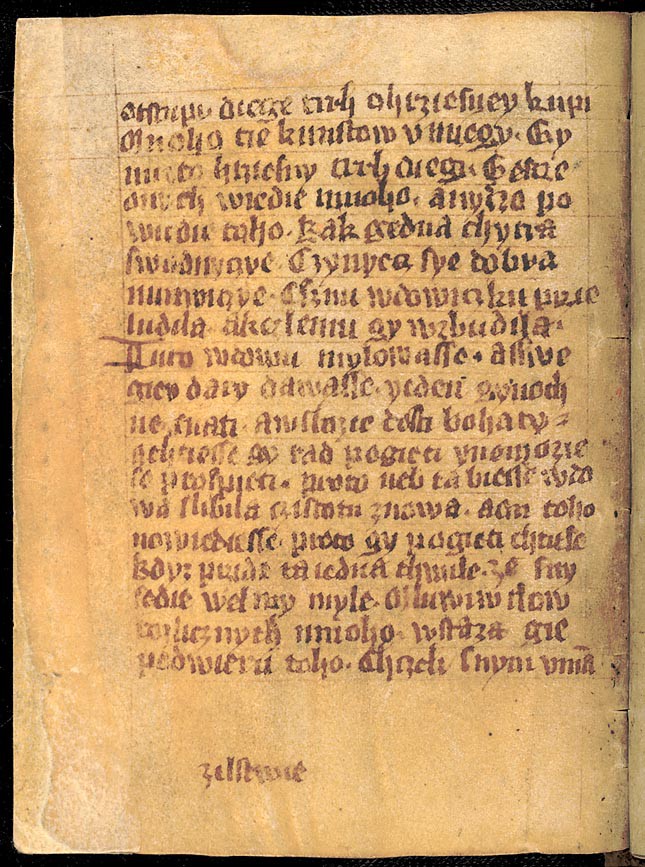| Author | unknown |
| Genre | Epic, Poem |
| Keywords | 14th century, Hradec Manuscript, Old Czech, paraphrase, the Decalogue |
| Title (in Czech) | Desatero kázanie božie |
| Title (in English translation) | The Ten Commandments |
| Editor | Andrea Svobodová – Štěpán Šimek |
| Translator | Walter Schamschula |
| Edited source | Praha, Národní knihovna České republiky, XXIII G 92, ff. 102v-106v |
| Introduction | Walter Schamschula – Andrea Svobodová |
| TEI P5 XML Encoding | Jitka Filipová – Michal Mocňák – Ondřej Tichý |
| Summary of content | Old Czech verse satire directed against the moral weaknesses of society based on the text of the Decalogue. |
Introduction to the Text
The primary intention of the poem Desatero kázanie božie (‘The Ten Commandments’) is moral instruction on the basis of the Decalogue (Ex. 20:2-17, Deut. 5:6-21). After an introduction to the origins of the commandments, however, the author takes the opportunity to describe various types of people who transgress against them. These descriptions tend to be satirical. In certain cases the author uses literary models, as in our example, a “fabliau”, an entertaining verse tale very popular in medieval France.
The fabliau of the weeping dog has Eastern origins (probably from India) and seems to have migrated to Europe during the Crusades. It appears in Early Middle English literature as ‘Dame Sirith and the Weeping Bitch’ (around 1280), which is one of the few examples of an Old English fabliau before Chaucer. This Early Middle English work includes some anticlerical features, since the young man in love is a priest. The subject also occurs in German literature, e.g. in a play by Hans Sachs (1494-1576). The Old Czech version whose immediate source has not been found (the fabliaux were often passed down orally by jugglers and vagrant scholars, but they originated primarily in Northern France) emphasizes the immorality of adultery. It is therefore part of the chapter devoted to the 6th commandment (according to the Catholic Catechism: Thou shalt not commit adultery; in the Protestant version this is the 7th commandment).
The Desatero consists of 1196 verses altogether. It is part of the Hradecký rukopis, a collection of 11 Old Czech works found in the city of Hradec Králové, and is now kept at the National Library of the Czech Republic in Prague. Together with the other parts of the manuscript, V. Chaloupecký dates it to the late 14th century, E. Smetánka to the 3rd quarter of the 14th century, and A. Havlík, J. Jakubec and A. Novák to the years between 1325 and 1340. The strong anticlerical and antimonastic accents (in the 7th commandment, for example) seem, however, to point in the direction of pre-Hussitism (approximately the last third of the 14th century).
Introduction to the Sources
The text has survived in two copies from the last quarter of the 14th century, one complete, in the Hradec Manuscript (Praha, Národní knihovna České republiky, XXIII G 92, ff. 94r-120v; available online), the other partial (Praha, Archiv Pražského hradu, collection Knihovna Metropolitní kapituly u sv. Víta, N 17, ff. 153r-158r; not available online). There is also a fragment of the first 54 verses (Praha, Národní knihovna České republiky, XVII E 8, fol. 57r-57v; available online).
About this Edition
The edition contains an excerpt of the 6th commandment. The given transcription was made according to the only fully surviving manuscript, taking into account the edition of Walter Schamschula (cf. Schamschula 1991, see Existing editions below).
The present translation has been taken, with the permission of Walter Schamschula, from the text of his edition. No textual changes have been made to the text, and only obvious typographical errors have been removed (cf. Schamschula 1991, see Existing editions below). The introductory information, based on Schamschula´s edition, has been supplemented from new contributions on the topic.
Existing Editions
Starobylá skládanie: Památka XIII. a XIV. věku. Díl 1., Václav Hanka (ed.), Praha 1818, pp. 52-107 [ms. XXIII G 92; standardized transcription].
Desatero kázání Božích, in: Výbor z literatury české 1, Pavel Josef Šafařík (ed.), Praha 1845, cols. 231-264 [standardized transcription].
Hradecký rukopis, Adolf Patera (ed.), Praha 1881, pp. 246–357 [ms. XXIII G 92, variants from ms. N 17; semi-diplomatic transcription, standardized transcription].
Desatero kázanie božie, Časopis Musea Království českého 67, 1893, Adolf Patera (ed.), pp. 246-247 [ms. XVII E 8, variants from mss. XXIII G 92, N 17; semi-diplomatic transcription].
Desatero kázanie božie, in: Staročeské satiry z Hradeckého rukopisu, Jan Vilikovský (ed.), Praha 1942, pp. 19-59 [ms. XXIII G 92; standardized transcription].
Výbor z české literatury od počátků po dobu Husovu, Bohuslav Havránek a kol. (eds.), Praha 1957, pp. 297-316 [ms. XXIII G 92 (excerpts: 6th and 7th commandments); standardized transcription].
Desatero, in: Staročeské satiry Hradeckého rukopisu a Smilovy školy, Josef Hrabák (ed.), Praha 1962, pp. 55-89 [ms. XXIII G 92; standardized transcription].
Hradecký rukopis: sborník českých veršovaných skladeb z 2. poloviny 14. století, Bohuslav Havránek (ed.), Praha 1969 [ms. XXIII G 92; facsimile].
Desatero kázanie božie/The Ten Commandments, in: An Anthology of Czech Literature. 1st Period: from the Beginnings until 1410, Walter Schamschula (ed.), Frankfurt am Main – Bern – New York – Paris 1991, pp. 141-148 [ms. XXIII G 92; standardized transcription].
Existing translations
Desatero kázanie božie/The Ten Commandments, in: An Anthology of Czech Literature. 1st Period: from the Beginnings until 1410, Walter Schamschula (ed.), Frankfurt am Main – Bern – New York – Paris 1991, pp. 141-148 [ms. XXIII G 92].
Further Reading
Pražák, Emil: Desatero kázanie božie, in: Lexikon české literatury A-G, Praha 1985, pp. 533-535 [encyclopedic entry listing editions and literature up to 1985]. Available at: https://service.ucl.cas.cz/edicee/lexikon/lexikon/254-lexikon-ceske-literatury-osobnosti-dila-instituce-1-a-g
Lehár, Jan: Rukopis hradecký, in: Lexikon české literatury P-Ř, Praha 2000, p. 1327-1329 [encyclopedic entry listing editions and literature up to 2000]. Available at: https://service.ucl.cas.cz/edicee/lexikon/lexikon/256-lexikon-ceske-literatury-osobnosti-dila-instituce-3-ii-p-r
